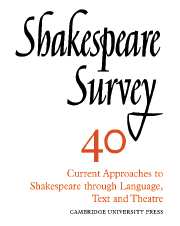Book contents
- Frontmatter
- Reconstructing Shakespeare, or Harlotry in Bardolatry
- Playing Shakespeare
- Take me to your Leda
- Sign Theory and Shakespeare
- Time in Richard III
- New Concepts of Staging A Midsummer Night’s Dream
- Henry V as Working-House of Ideology
- Shakespeare and his Sources: Observations on the Critical History of Julius Caesar
- The Speculative Eye: Problematic Self-Knowledge in Julius Caesar
- Learning by Talking: Conversation in As You Like It
- Measure for Measure: Mirror for Mirror
- Allegory and Irony in Othello
- Cruelty, King Lear and the South African Land Act 1913
- The Rationale of Current Bibliographical Methods: Printing House Studies, Computer-Aided Compositor Studies, and the Use of Statistical Methods
- Shakespeare’s Late Plays at Stratford, Ontario
- Shakespeare Performances in London, Manchester and Stratford-upon-Avon 1985–6
- The Year's Contributions to Shakespearian Study 1 Critical Studies
- 2 Shakespeare’s Life, Times, and Stage
- 3 Editions and Textual Studies
- Index
Playing Shakespeare
Published online by Cambridge University Press: 28 March 2007
- Frontmatter
- Reconstructing Shakespeare, or Harlotry in Bardolatry
- Playing Shakespeare
- Take me to your Leda
- Sign Theory and Shakespeare
- Time in Richard III
- New Concepts of Staging A Midsummer Night’s Dream
- Henry V as Working-House of Ideology
- Shakespeare and his Sources: Observations on the Critical History of Julius Caesar
- The Speculative Eye: Problematic Self-Knowledge in Julius Caesar
- Learning by Talking: Conversation in As You Like It
- Measure for Measure: Mirror for Mirror
- Allegory and Irony in Othello
- Cruelty, King Lear and the South African Land Act 1913
- The Rationale of Current Bibliographical Methods: Printing House Studies, Computer-Aided Compositor Studies, and the Use of Statistical Methods
- Shakespeare’s Late Plays at Stratford, Ontario
- Shakespeare Performances in London, Manchester and Stratford-upon-Avon 1985–6
- The Year's Contributions to Shakespearian Study 1 Critical Studies
- 2 Shakespeare’s Life, Times, and Stage
- 3 Editions and Textual Studies
- Index
Summary
I can only talk about Shakespeare as he came into my life, because I am no scholar – I have no academic knowledge. I was very fortunate that, in the nursery, I was given Lamb’s Tales, and so I knew the stories and the characters as part of my enjoyment of fairy-tales and romances. Therefore, when I came to read the Shakespeare plays, I found that they were familiar ground: they were about people that I knew, and what fantastic stories! I was very fortunate, too, in that I went to a school where we started reading Shakespeare at about the age of ten. We didn’t go in for glossaries and footnotes; we stood up in class and read out the texts; so the characters then started to come alive to us, as they had been alive in my mind. And then I became absolutely addicted to the language. I remember A Midsummer Night’s Dream as – perhaps naturally – the first play we read. The Merchant of Venice was the next, and it positively fired me with a desire to put the play on. I must have been about eleven or twelve when I directed the last scene of The Merchant of Venice and we performed it to the school. After that we studied a play in class every year. In addition, in those days we had what we called an elocution class, which was an ‘extra’ and there we rehearsed and performed an entire Shakespeare play each year. The first I remember was As You Like It, and I was rather bored by playing Celia and very delighted when I achieved Cassius in Julius Caesar.
- Type
- Chapter
- Information
- Shakespeare Survey , pp. 11 - 20Publisher: Cambridge University PressPrint publication year: 1988

